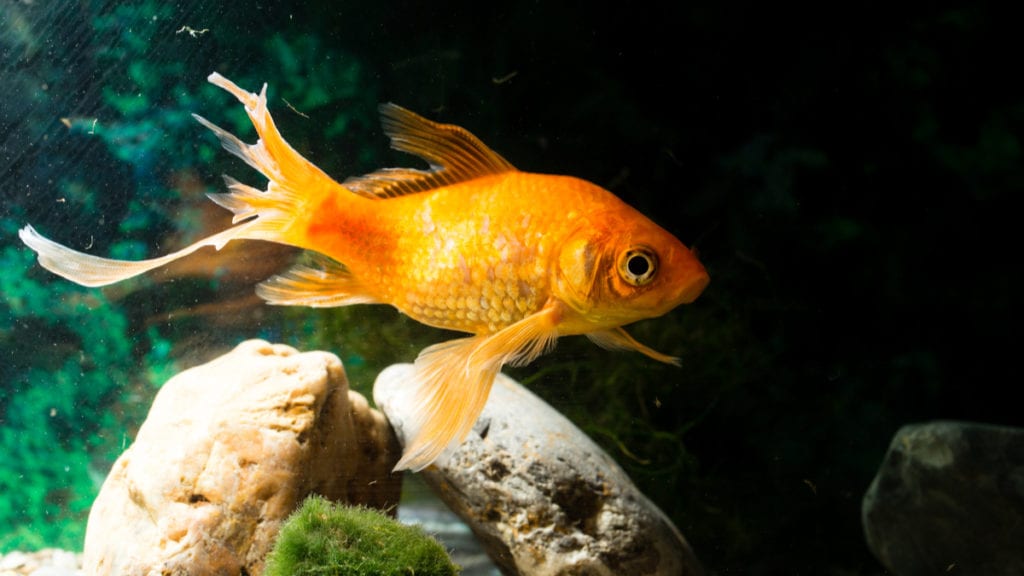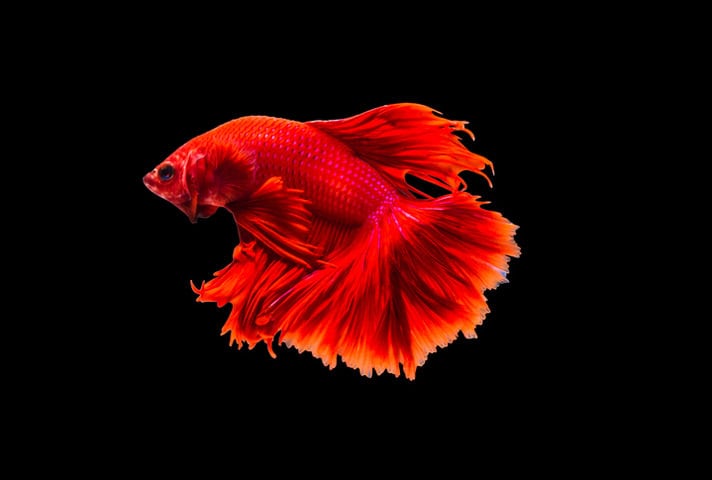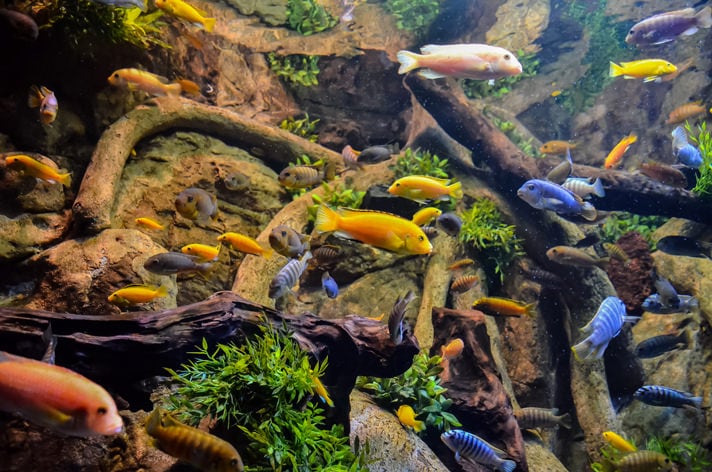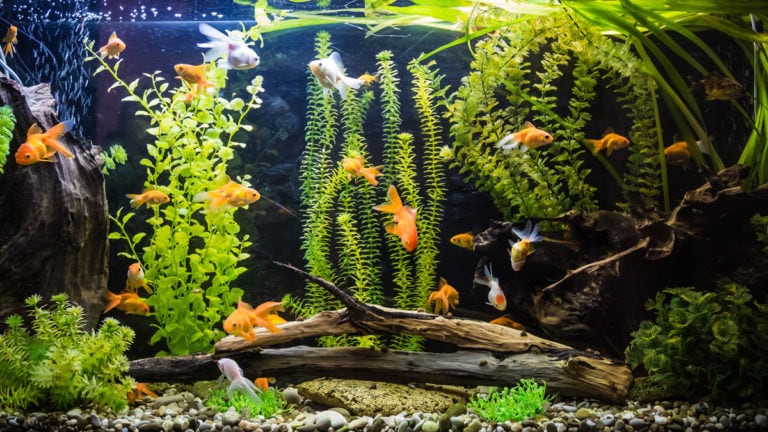Stress is bad for all living things. With fish, stress is a tremendous problem because they can’t do anything to reduce it. We can change jobs or mates, or turn on the air conditioner. Fish have to exist in the little glass boxes that we call fish aquariums, and they are totally dependent on us to alleviate any stress they may be having.
Causes of Stress in Fish
In general, fish are pretty resilient creatures, and as long as their living conditions are fairly consistent, they can put up with some stress. So, what are the stressors that fish face the most?
Sudden changes in the environment. This is one of the most common causes of stress to fish. Most hobbyists do not do enough water changes, so the water their fish are swimming in slowly becomes their toilet; still, most fish can often continue to hang on. Doing a major water change after having not done one for months will cause an immense amount of stress to your fish.
A sudden change in temperature from a heater failing will be very stressful for your fish. Adding something to the tank that causes a large swing in pH or hardness, such as putting in that nice piece of rock that you found at the beach, also adds to the stress on your fish.
The wrong conditions for certain fish. This will cause a relatively low level of stress — but this can eventually do the fish in. Most of the fish you will see at your local fish store have been commercially bred, and for them it doesn’t matter much what the conditions in the wild were for their ancestors; most can get along at neutral values for pH and hardness, and at a temperature around 74 degrees Fahrenheit. However, certain types of fish require special water conditions. African cichlids, for example, need hard, alkaline water, and they will not do well in the soft, acidic water that cardinal tetras thrive in. Discus (Symphysodon spp.) really need the tank to be warm, at least in the low 80s. At the normal temperature we keep most tropical fish, discus will be stressed and will slowly wither away and die. Goldfish require colder temperatures, and if they are kept much above 75 degrees, they can become stressed.
Bullies
Bullying from other tankmates can also be extremely stressful. After all, if a fish in the wild blunders into the breeding territory of a pair of angels (Pterophyllum), the angels will simply chase that fish away, and it can flee to safety. In the small confines of an aquarium, the offending fish has nowhere to go. Because it cannot escape the territory of the other fish, it will be bullied—and stressed—continually, sometimes to death. Some fish become bullies to all the other fish in the tank, and in that case, the only way to remove the stress is to remove the bully. When a group of fish (usually cichlids) has been raised together and begins to pair off to spawn, there is tremendous stress on the fish that are not part of a spawning pair. This results in fish being pinned up in the corner of the tank, and either the pair has to be moved away to connubial bliss in another tank, or all of the fish except the pair must be removed.
Diseases and/or Parasites
These can induce stress in fish, but usually it is stress that leads to a disease or a parasitic invasion, rather than the other way around. Many of the diseases and parasites that afflict fish are present in tanks much of the time.When healthy and unstressed, most fish can successfully fight off most diseases and parasites through their immune systems and the protection from the skin, scales and slime coat. However, when stressed from any of the conditions discussed earlier, fish can quickly break down and succumb to diseases or parasites. In fish, as in many animals, disease usually is not the cause for stress; often stress leads to disease.
Signs of Fish Stress
When fish have a parasite, such as ich (little white spots), fungus (white cottony growths) or a bacterial infection (red spots on fins and belly), you can usually notice it fairly easily. When fish are subjected to stress, the observable aspects are different, sometimes being subtle and other times dramatic. Fish suffering from a low but continuous level of stress (for example, from the wrong water conditions) will just appear “off” or “not right.” They will not be very active, won’t feed well and in general will appear different from how they should be or how they used to be. This is what happens with goldfish kept too warm, discus that are not warm enough or African cichlids in soft/acidic water. If you let your tank go too long without doing a water change, you will be subjecting your fish to a constant, relatively low level of stress. Eventually, all but the absolutely hardiest fish in the tank will succumb, one by one.
Fish that are stressed will appear and behave differently from how they normally would. Some fish, such as discus, will become dramatically darkened when stressed, to the point of almost turning black in color. Other fish will show stress by becoming completely pale — they will lose the lines, bars and spots that they normally have, and appear to be a colorless fish. Any change in the appearance or behavior of a fish can be a sign of stress.
Dramatic Incidents of Stress Cause Dramatic Symptoms
The fish that is bullied by a tankmate will be hiding, usually in the top corners of the aquarium. Stress from any kind of poisoning, such as the cleaning spray that got into the tank, or the two-year-old who dumped the entire can of fish food in, will manifest itself in very clear and dramatic symptoms. Fish stressed like this will breathe very heavily and often will simply hang at the top of the water, gulping for air. What is happening is that the fish are unable to get the oxygen they require from the water, since the cause of the stress has removed the oxygen, added other things that are poisonous or blocked the fish’s gills so they do not work properly.
“Destressing”
When fish appear stressed, take immediate action, and eliminate the cause of that stress. Fish are completely at the mercy of hobbyists, and usually their stress comes from something that we did to them. The first thing to do if you think your fish are stressed is test the water conditions. Test for pH, ammonia, nitrite and nitrate, and if any of those parameters are out of kilter, you need to take corrective action. If the water parameters are fine, the next thing to do is to check the equipment. What is the temperature, and is the heater working properly? Is the fish tank filter moving water as it should, and is the filter media doing its job or does it need to be changed? Did something accidentally get spilled into the tank? Does the water look clear, or is it cloudy or discolored?
If there is a fish that is bullying other fish, remove the bully. If it is a pair of cichlids (the most common being convicts, kribs or angels) that have decided to set up house and are trying to eliminate all other fish from their territory, remove either the newly formed pair or the other fish. If fish are experiencing acute stress (i.e., gasping up at the surface, lying on the bottom and not moving, or darting around the tank), you can be pretty sure that the water has been poisoned in some way. Maybe cleaning sprays got into the tank, or something released toxins into the water. When fish show that much stress, get them into better water conditions immediately. If they do not seem to be in acute danger of dying immediately, do a 50-percent water change, making sure that the new water you put in is conditioned and good for fish; or if you have another tank available, you can move the stressed fish into the other tank, assuming that you know that the water in that tank is good and that the inhabitants of that tank cannot harm the refugee fish. Act quickly — if you hesitate too long, you will probably lose all of the fish.
Other than stress caused by a bullying fish or a newly formed breeding pair, most stress that fish are exposed to comes from the water conditions. Regular water changes of 20 percent every week (or at least every other week) will go far toward preventing stress in your fish. Remember that you are probably the indirect cause of most stress that your fish suffer — and you are also the only thing that can remove that stress for them.
Like all animals, fish can be physically affected by stress. Some fish will eventually die if subjected to the wrong conditions. Melanochromis labrosus and other African cichlids should live in hard, alkaline water. Healthy, unstressed fish can normally fend most diseases off with their immune system, along with their protective slime coating. Discus (Symphysodon) should have warm water that is at least in the low 80s Fahrenheit. Cooler conditions could slowly wear away at their health.
Read More
Posted By: Chewy Editorial
Share:









